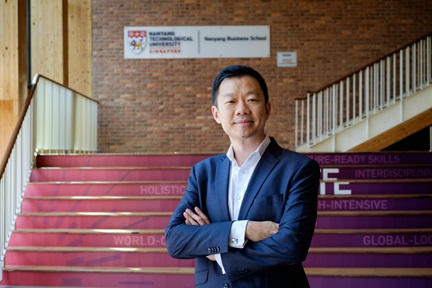Surfers of the machine revolution: Asst Prof Jack Tong
Asst Prof Jack Tong's research paves the way for greater trust of technologies powered by artificial intelligence.

Some areas in which AI can potentially bring about positive changes are in boosting workforce productivity and helping people make better decisions. For instance, AI tools can be employed to assess work quality and provide feedback. However, not everyone welcomes AI with open arms. Employees may not appreciate being monitored by AI and develop a distrust of the technology. Customers may also not feel comfortable communicating with an impersonal AI chatbot when they are seeking assistance in making purchases.
Asst Prof Jack Tong of NTU’s Nanyang Business School wants to understand how the adoption of such AI tools in the workplace could affect employees’ motivation and commitment. He is also interested in how innovations such as chatbots powered by AI can influence customer purchasing behaviour.
“My research centres around understanding the business impact of AI on the operation of firms and customers’ decision making,” says Asst Prof Tong.
“By unpacking the underpinning mechanisms of the potential impact of AI, my research empowers policymakers to understand whether and how investments in AI-related technology could improve the working efficiency of employees or help customers make better purchase decisions.”
In the workplace, companies often face a dilemma when disclosing the use of AI tools to employees. Although AI can provide employees with more sophisticated feedback than human managers, being monitored by AI may reduce work productivity if employees view AI negatively.
Asst Prof Tong has found that AI gives more effective feedback than humans to improve employee performance. On the other hand, revealing to employees that their feedback was AI-generated caused a drop in job performance, compared to those who received feedback from human managers. Employees who have been in the organisation for a longer time perceived AI feedback less negatively than newer employees.
These findings suggest that for both firms and employees to benefit from AI, organisations should tailor the use of the technology to provide feedback to certain employees who are more likely to respond positively.
The research was published in Strategic Management Journal and was the most downloaded paper during the first 12 months of its release.
Informing customers that they are speaking to AI chatbots also affects their purchasing decisions, as Asst Prof Tong has discovered. Chatbots are known to be as effective as experienced customer service officers and more effective than non experienced workers in guiding customers to make their purchases. However, revealing the identity of the chatbot to the customers beforehand caused their purchase rates to drop by almost 80%. This effect was mitigated when the revelation of the AI chatbot was made later in the purchase process.
Asst Prof Tong has received a grant from AI Singapore – a national programme in AI, set up to enhance Singapore’ s AI capabilities to power the country’s future digital economy – under its AI governance programme. He has also been awarded a Tier One grant from the Ministry of Education in Singapore to deploy an AI-powered mobile app for cancer screening in the elderly.
The article appeared first in NTU's research & innovation magazine Pushing Frontiers (issue #22, August 2023).


.tmb-listing.jpg?Culture=en&sfvrsn=38779dd7_1)

.tmb-listing.jpg?Culture=en&sfvrsn=246046da_1)

.tmb-listing.jpg?Culture=en&sfvrsn=259d5325_1)